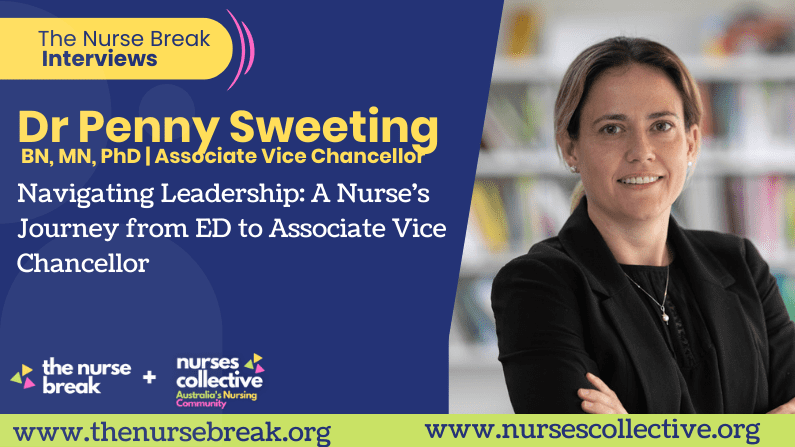Table of Contents
Embark on Dr. Penny Sweeting’s transformative journey from emergency nursing to academic leadership at Charles Darwin University. Discover strategies for building trust, navigating leadership, insights into inpatient safety research, and the art of fostering interdisciplinary collaboration. Explore the essential qualities for leadership in higher education and healthcare. Join us as we delve into the personal and professional growth of this remarkable leader.
Read more articles from nurse academics and researchers here
Submit an expression of interest to write an article for us or suggest someone we should interview next
Join Our free Australian Nursing Community:
- Nurses, Students, Nurse Academics, Researchers, and Educators: Register at www.nursescollective.org Connect with leaders and educators across Australia
From Emergency Nursing to Academic Leadership
When I look back on my journey from clinical nursing to education to university management, I sometimes wonder how I ended up here. However, there are quite a few synergies between the two roles. For example, delivering a high-quality service in a very complex and highly regulated field. In the Emergency Department I learned how to work under pressure, with diverse teams, and how to communicate effectively with people from all walks of life. My previous work and roles help me keep things in perspective.
Strategies for Building Trust and Stakeholder Relationships
My approach to building these relationships is really cemented in trust, mutual respect, and integrity. I believe that it is important to be genuine and to demonstrate the mutual benefits of connecting and working together. What is critically important is communication. Communication is always key to any relationship and I have learned techniques as a nurse that have helped me just as much in the education sector as they did in healthcare.
Guiding Teams Through Change in Healthcare and Education
Change can be unsettling, and everyone’s response to change will be different. One thing I believe is that to be a good leader is to ensure that everyone is offered a space to voice their opinion and feedback regarding the change, and as a leader, we need to respect everyone’s opinions about change. This can be hard, especially for new leaders, so I would suggest having a mentor or someone you trust to help you navigate these challenges. The last point I will make is to be open and honest.
Tackling Hospital Suicides: Research Challenges and Solutions
What was really interesting about my research was that there was a big gap in research in this area, but we found that the things that impacted patient safety were things that every clinician knows. If you asked any nurse what would make inpatient care potentially unsafe, they would tell you high workloads, not enough beds, dangerous physical environments, and these were all shown to be true in my research. As mentioned in my research, for hospitals to be safe, it requires everyone to be focused on safety, from hospital executives right down to the nurses on the floor.
Key takeaways from international conferences
One of the biggest things I have learned from presenting at international conferences, especially multidisciplinary conferences, is that people are genuinely interested in what you have to say. You will feel nervous but remembering that your topic is important, and people want you to do well will help you overcome some of that stage fright. Me included! In terms of how these experiences have shaped my approach to healthcare improvement, the biggest takeaway for me is that diverse perspectives are needed to address our biggest healthcare challenges. When people approach things through a different lens you often produce great innovation that truly makes a difference.
Fostering Interdisciplinary Collaboration in Healthcare
Collaboration is important in any industry. I think everyone’s perspective is unique and can offer valuable insight into ideas or areas that you may not have previously considered. To encourage collaboration, I try and role model it in my work and in my research Currently, I am working on a project with two colleagues from very different backgrounds, and it has been a wonderful experience to learn from them.
Essential qualities for effective leadership in the higher education and health sectors
Based on my experience, I think empathy is a very important quality for leadership in education and healthcare. Empathy is the ability to connect with people on a human level. Leadership is an art that requires practice, self-reflection, and sometimes a bit of trial and error. I am learning every day and sometimes make mistakes, but that’s okay because it is all part of the journey.
Could you share any upcoming goals or projects you’re excited about
One of my big goals is to ensure that CDU remains synonymous with high-quality education and exceptional student experiences. We are a fabulous university and have some of the best educators, researchers, and professional staff in the country. Supporting students and staff to thrive and reach their goals is really important to me.
Personal passion or hobby that brings balance to your life and enhances your leadership skills?
Outside of work, I am really passionate about Brazilian Jujitsu! I started training a few years ago when I was experiencing some personal struggles, and it has really helped me stay grounded and present. I train with people from all walks of life, which has really helped me build my confidence. In Jujitsu we learn to keep our emotions in check, to work-under pressure and how to problem-solve, all qualities of a great leader. The best thing about jujitsu is that it has pushed me out of my comfort zone and showed me that I was capable of anything. This self-belief has benefited me professionally.





